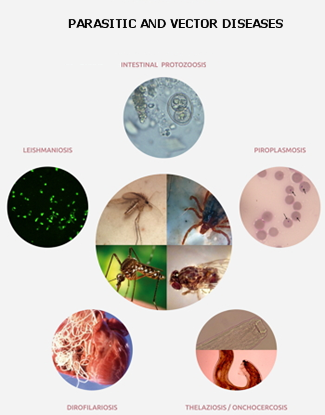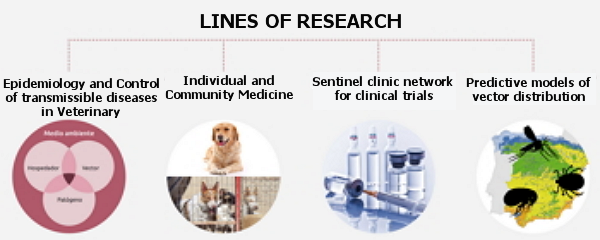PARASITIC DISEASES IN COMPANION ANIMALS
|
Description |

Diseases investigated in the Epidemiology and Control Group of transmissible diseases in veterinary medicine.
PET Parasite LAB is a research group that collaborates with some public and private companies. Their research lines focus on the epidemiology and control of parasite and vector-borne diseases with special interest on zoonotic diseases that affect pets.
Lines of investigation:
- Epidemiology and control: Epidemiology and control of parasitic diseases of public health concern (eg. leishmaniosis, other vector borne-diseases: toxoplasmosis, giardiosis toxocariosis, etc.)
- Technical assistance: Technical assistance in the control of parasite diseases: technical advice and interpretation of the results of case reports of parasite or vector-borne diseases affecting pets. Managing transmissible diseases in dogs and cats: shelter medicine (preventive medicine, outbreak control, check-ups in animals for adoption).
- Clinical trials: Clinical trials based on Good Clinical Practice (GCP Directive 2005/28/EC) and Good Laboratory Practice (GLP Directive 2004/9/EC and Directive 2004/10/EC). Therapeutic and prophylactic efficiency of external and internal anti-parasite agents both in vivo and in vitro in companion animals. Efficacy of new molecules and new indications of approved drugs already on the market.
- Predictive modelling: Implementing predictive models of the spatio-temporal dispersion of arthropod vectors based on climate and environmental data using spatial analysis and geographical information system tools (GIS).
|
How does it work |
Equipment and facilities:
- Parasite life cycles: Establishment of arthropod, protozoa and nematode life cycles.
- Laboratories equipped for light and fluorescence microscopy, along with coprological parasite disease diagnosis studies.
- Molecular techniques for the etiological diagnosis of parasitic diseases.
|
Advantages |
The One Health concept promoting coordinated work on the prevention of diseases with repercussions on public and animal health. Active collaboration with the Instituto de Salud Pública of the Comunidad de Madrid through a formal collaboration agreement targeted at controlling the main dog and cat zoonoses in the Comunidad de Madrid. A leishmaniosis surveillance system among stray dogs in the region of Madrid is ongoing since 1996. Our group has been pioneer in the reporting of emerging zoonotic diseases such as thelaziosis and feline tritrichomonosis.

Research Lines of the Group
|
Where has it been developed |
PET Parasite LAB is a multidisciplinary group formed by investigators in Veterinary, Biology and Parasitology. Their research lines focus on the epidemiology and control of parasite and vector-borne diseases with special interest on zoonotic diseases that affect pets.
|
And also |
Strong points:
- International links: representative of the European scientific society ESCCAP (European Scientific Counsel Companion Animal Parasites) Spain and presidency of LeishVet. Cooperation with renowned outside researchers.
- Collaborating international institutions and staff: Prof. Peter Irwin Univ. Murdoch Perth, W Australia; Prof. Dwight Bowman Univ. Cornell-USA; Prof. Domenico Otranto Univ. Bari, Italia; Prof. Gad Baneth Univ. Tel-Aviv, Israel; Prof. Patrick Bourdeau Univ. Nantes, Francia.
- Access to a relevant casuistry, based on cases managed at the Veterinary Teaching Hospital, of the main parasite diseases affecting dogs and cats such as intestinal parasites, feline toxoplasmosis, canine leishmaniosis, feline retrovirosis and other vector-borne diseases.
- Technical assistance in the control of parasite diseases: technical advice and interpretation of the results of case reports of parasite or vector-borne diseases affecting pets. Managing transmissible diseases in dogs and cats: shelter medicine (preventive medicine, outbreak control, check-ups in animals for adoption).
- Established national network of sentinel veterinary clinics prepared to participate in clinical and/or epidemiological studies.
- Collaboration with veterinarian dermatology experts.
|
Contact |
|
© Office for the Transfer of Research Results – UCM |
|
PDF Downloads |
|
Classification |
|
Responsible Researcher |
Guadalupe Miró Corrales: gmiro@ucm.es
Department: Animal health
Faculty: Veterinary Medicine


